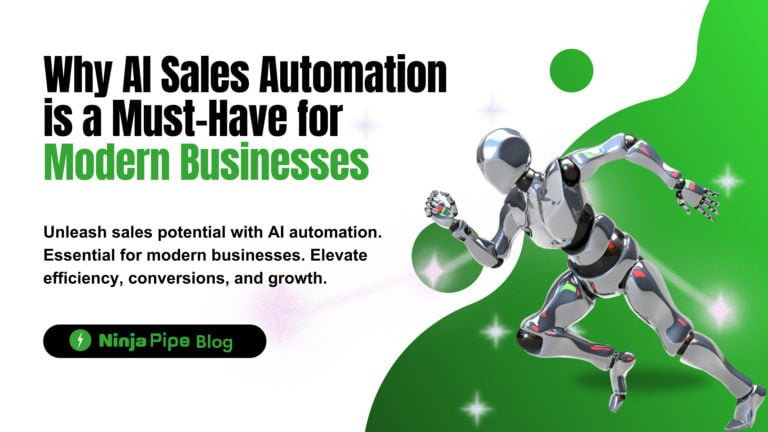Revolutionize sales with AI automation. Elevate efficiency & sales growth. Discover the game-changer for modern businesses.
Introduction
Sales efficiency plays a crucial role in the success of any business. It involves optimizing sales processes to maximize productivity, streamline workflows, and deliver exceptional customer experiences. In today’s digital age, businesses are turning to artificial intelligence (AI) sales automation as a game-changing solution to boost sales efficiency.
How AI Sales Automation Works
AI sales automation leverages sophisticated algorithms and machine learning to analyze vast amounts of data and generate insights. By utilizing historical customer data, AI algorithms can identify patterns and make accurate predictions about customer behavior and preferences. These insights enable businesses to make informed decisions and take proactive actions to optimize their sales strategies.
Data collection and analysis form the foundation of AI sales automation. Customer interactions, such as emails, phone calls, and website visits, are captured and analyzed to understand individual preferences and buying patterns. This data is then used to create personalized experiences and targeted marketing campaigns, resulting in higher conversion rates.
Benefits of AI Sales Automation
Implementing AI sales automation offers several significant benefits for businesses:
1. Increased productivity and time savings
Automating repetitive and time-consuming tasks allows sales representatives to focus on building relationships and closing deals. AI sales automation handles activities like data entry, lead nurturing, and follow-ups, freeing up valuable time for sales teams.
2. Improved lead generation and qualification
AI algorithms can analyze customer data to identify high-potential leads and prioritize them based on various criteria. By automating lead qualification, businesses can ensure that their sales teams are focusing their efforts on leads with the highest likelihood of conversion.
3. Enhanced customer engagement and experience
With AI sales automation, businesses can personalize their interactions with customers at scale. By analyzing customer data, AI algorithms can anticipate customer needs and provide tailored recommendations. This personalization creates a more engaging and customized experience, leading to higher customer satisfaction and loyalty.
4. Streamlined sales processes and workflows
AI sales automation optimizes sales workflows by automating repetitive tasks and streamlining processes. This automation reduces manual errors, ensures consistency in sales practices, and enables sales teams to operate more efficiently.
Implementing AI Sales Automation
Implementing AI sales automation requires careful planning and execution. Here are the key steps to follow:
1. Assessing business needs and goals
Identify specific pain points in your sales processes and determine how AI sales automation can address them. Outline clear goals and objectives to align the implementation with your business strategy.
2. Choosing the right AI sales automation solution
Research and evaluate different AI sales automation tools and platforms. Consider factors such as scalability, integration capabilities, and ease of use. Choose a solution that aligns with your business requirements and budget.
3. Data integration and system setup
Ensure that your existing customer data is properly integrated into the AI sales automation system. This ensures the availability of accurate and comprehensive data for analysis. Set up the AI system and configure it according to your business needs.
4. Training and onboarding sales teams
Provide comprehensive training to your sales teams to familiarize them with the AI sales automation system. Emphasize the benefits and support their adoption of the new technology. Continuous monitoring and feedback loops are essential for ongoing success.
Overcoming Challenges
Implementing AI sales automation can come with certain challenges. Here are some common hurdles and how to overcome them:
1. Resistance to change and adoption
Introduce the concept of AI sales automation gradually and showcase its benefits to gain buy-in from sales teams. Provide training and support to ease the transition and address any concerns or resistance.
2. Ensuring data accuracy and security
Implement data validation processes and safeguards to ensure the accuracy and security of the data used by the AI system. Regularly review and update security measures to protect sensitive customer information.
3. Balancing automation with human touch
While AI sales automation brings efficiency, it is crucial to maintain a human connection with customers. Encourage sales representatives to engage personally with customers and use AI insights as a tool to enhance their interactions.
4. Monitoring and optimizing AI sales automation
Regularly monitor and analyze the performance of the AI sales automation system. Identify areas for improvement and refine the algorithms and processes based on real-time feedback and market changes.
To over come these challenges NinjaPipe Introduce the best solution
AI Appointment Setter and Sales Close Bot

Experience the power of AI Close Bots, which are highly trained sales bots that can engage with hundreds of customers simultaneously. These bots are based on millions of sales data points and can communicate professionally through SMS or emails, making them faster and more efficient than humans. They sync confirmed appointments with your calendar, allowing you to easily track upcoming meetings.
These bots work full-time, never taking breaks or needing salaries, and imitate human conversations expertly. They are partnered with OpenAI to represent your business in a polished and appealing manner, automating various aspects of sales, making your life simpler. Try out the automation features for your business with a 14-day free trial.
Future Trends in AI Sales Automation
AI sales automation continues to evolve, and several trends are shaping its future:
1. Advancements in natural language processing and chatbots
AI-powered chatbots are becoming more sophisticated in understanding and responding to customer inquiries. Natural language processing enables chatbots to engage in human-like conversations, providing personalized assistance and information.
2. Integration with voice assistants and IoT devices
AI sales automation is increasingly being integrated with voice assistants such as Alexa and Google Assistant. Customers can interact with businesses and make purchases using voice commands, creating seamless and convenient experiences.
3. AI-powered sales forecasting and predictive analytics
Advanced AI algorithms enable accurate sales forecasting and predictive analytics. Businesses can leverage these insights to identify market trends, anticipate customer demands, and make data-driven sales decisions.
4. Augmented reality for virtual sales experiences
Augmented reality (AR) technology is transforming the way customers experience products. By using AR, businesses can offer virtual product demonstrations and visualize how their offerings fit into customers’ lives, enhancing the sales process.
Conclusion
AI sales automation is a game-changer for businesses aiming to boost sales efficiency. By leveraging AI algorithms and machine learning, businesses can enhance productivity, improve lead generation, and provide personalized customer experiences. It’s crucial for businesses to embrace AI sales automation as it continues to evolve and shape the future of sales.
FAQs
1. How much does AI sales automation cost?
The cost of AI sales automation varies depending on the solution and the scale of implementation. It’s recommended to consult with AI vendors or solution providers to get accurate pricing tailored to your business needs.
2. Can AI sales automation replace human sales representatives?
AI sales automation complements human sales representatives by automating repetitive tasks and providing valuable insights. While it can optimize sales processes, the human touch and interpersonal skills of sales representatives remain crucial for building relationships and addressing complex customer needs.
3. Is AI sales automation suitable for small businesses?
AI sales automation can benefit businesses of all sizes. While the initial setup may require some investment, the long-term benefits, such as increased productivity and improved customer engagement, make it a valuable investment for small businesses as well.
4. What data is needed for effective AI sales automation?
Effective AI sales automation relies on a comprehensive dataset, including customer interactions, purchase history, demographics, and behavioral data. The more data available, the more accurate the AI algorithms become in predicting customer behavior.
5. Are there any ethical concerns with AI sales automation?
AI sales automation raises ethical considerations, such as data privacy and fairness in decision-making. It’s important for businesses to establish transparent data practices and ensure compliance with regulations to maintain trust with customers and stakeholders.








Leave a Comment